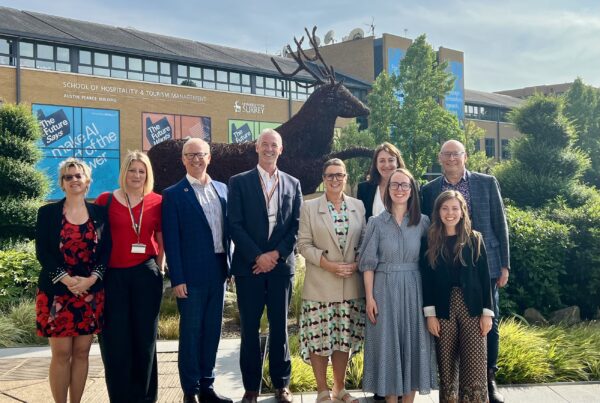A focus on learning innovation for old and new: opinion
The Universities Accord is open for consultation at an intriguing and dynamic time for the sector. It is inviting big ideas for higher education over a 20-to-30-year time horizon, at a stage when broader change and societal and economic transformation has been rapidly accelerated.
The evolution that was and is underway in learning, collaboration and working practices is being revolutionised by the fast learning of and adaptation to a global pandemic.
This is a climate ripe for new models and entrants to markets, unsaddled by the baggage of legacy infrastructures and assets, or reputations and brand positions.
It also creates opportunities for legacy brands and more traditional and well-established organisations if they can align their advantages of relationships, resources and experience with an appetite and ability to look ahead and innovate.
Innovation in higher education institutions is often constrained by regulation, governance, and complexity. It can be exposed to inertia borne of history, scale and, in some cases, complacency. This is to not to suggest that universities are incapable of innovating.
Across the sector, there have been many examples over time of institutions that have innovated to address new markets, introduce new products, and transform aspects of their business model or service delivery.
The emergence of a new model of education at the University of Melbourne shows how a large, traditional institution can do this. And the rapid growth of a privatised US-owned Torrens University of Australia to grow a business valued at over $1bn through online and industry engaged learning, shows how a new entrant can achieve it.
These are also times when current financial positions for universities are variable and have conflicting indicators. While $5bn plus surpluses have been declared from the sector’s 40 institutions in 2021, the short-term outlook particularly for domestic students for 3- or 4-year undergraduate degree courses is relatively bleak.
There would appear to be increasing evidence that this is more than just cyclical responses to economic conditions and the short-term labour market, or that a Costello boom will fix everything.
Lifelong learning needs are fast growing while evidence of uptake in postgraduate degree enrolments is not showing that existing products match that market need well. And although there has been some recovery in international student revenues, the risk and vulnerability of source countries, delivery modes and global competitors is increasingly evident.
This is a time, more than ever, that calls for radical and innovative thinking and activities. The situation calls for short-term market responses in current products and markets. But it also presents accelerating partnership opportunities with employers and service providers and other partners.
And all innovation must be increasingly mindful of what appears to be the imminence of long-term structural sector transformation and disruption. It is a time when we might expect to see bold examples of what both old and new providers might do to innovate, reposition, and seek impact for their sustainable future.
A case study of that is that of Melbourne Business School Ltd (MBS). Novel in Australia, MBS is a relatively young, small, and specialised entity with a corporate structure and strong business representation in its governance, while at the same time closely affiliated with and embedded in one of the nation’s largest, oldest, most research intensive, and highest rated traditional universities.
MBS has built its reputation on the offer of high-quality post-experience business degree programs, serving a largely domestic market with an on-campus experience. Attuned to shifts in learner expectations and the competitive environment, it is embarking on a journey of innovation, experimentation and exploration of new products, markets, and partnerships.
Its journey includes the launch of MBS Online, encompassing a suite of online degree programs, short courses, and custom solutions. It extends to the establishment of an Innovation Lab that it describes as “a catalyst for trailblazers to solve the biggest learning problems and launch innovations that redefine how curious learners and organisations grow.”
In all of its facets, MBS Learning Innovation has a focus on equitable and inclusive lifelong learning, with a strong emphasis on applying new technologies through partnerships both with technology providers and the business world in which the school is deeply rooted.
MBS could be a naturally occurring example of how innovation units are created in some larger organisations as a skunkworks, protected from the complexities and governance constraints of the larger and wider organisation, to allow focussed and unfettered experimentation and learning to happen at pace.
As with engineering settings skunkworks, it has potential for innovation to be harnessed and extended to a wider organisation.
It has the same constraints that all current academic institutions present in the inevitable challenges of situating a professionalised and novel innovation capacity and capability, within a host culture and environment of the academic heartland and its norms and conventions that may resist any change, let alone radical innovation.
But it has the benefit of being grounded in a single discipline of business where language, convention and expectations are more open to new ways of working and innovation. A single discipline playground without the need to make any new approaches immediately amenable and be accepted by chemists, the performing arts, a medical school and professional disciplines and their accreditation practices.
MBS is consciously cultivating an environment where the first step of an Online MBA becomes a foundation for an eco-system of learners, employer organisations, EdTechs and start-ups, alumni, and an extensive array of other partners to explore new delivery models, new products, new markets, and new ways of delivering to a new learning economy through a focus simultaneously on current offerings and the far horizon.
It is a particular, unusual, and fertile environment to be practising a distinctive form of learning innovation. It becomes a fascinating case study for the MBS itself, for the sector, and for all interested in what a new learning economy may evolve to become. And it was a focus for a discussion with the MBS Dean, Internal – Professor Caron Beaton-Wells – on a recent episode of the HEDx podcast you can access here.
First published in Campus Review on 22nd March 2023.
Emeritus Professor Martin Betts, Co-Founder of HEDx









